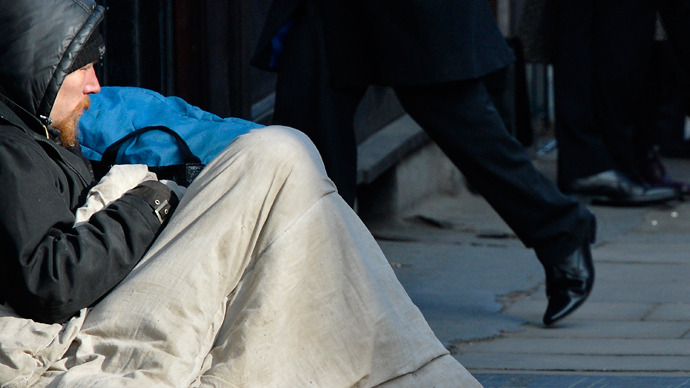500,000 people in the UK are resorting to food banks because of squeezes on benefits, wage cuts and the continuing economic downturn, with numbers trebling over the past year, a report by two leading British charities has warned.
A joint report by Oxfam and Church Action on Poverty has said that despite Britain’s position as one of the richest nations in the world an alarmingly high number of people are now forced to ask for help to feed themselves.
The charities said that reassessment of entitlement to invalidity benefits, new jobseekers allowance sanctions, and below-inflation rises in payments are the biggest reason for a surge in demand in food banks.
“The single biggest reason is delays or sanctions or problems with people’s benefit payments. And that is tied directly to the reforms and the cuts that are going on with benefits; increasingly they are having sanctions where their benefits are just stopped, which are being used in a very harsh and arbitrary way,” Liam Purcell, Communications Officer for Church Action on Poverty, told RT.
As well as those on benefits, food uncertainty has been exacerbated by wage cuts and falling living standards of many people in employment, with many also having the hours they can work cut.
“The shocking reality is that hundreds of thousands of people in the UK are turning to food aid. Cuts to social safety-nets have gone too far, leading to destitution, hardship and hunger on a large scale. It is unacceptable this is happening in the seventh wealthiest nation on earth,” Mark Goldring, the Chief Executive of Oxfam, told reporters.
The problem is exacerbated by the fact that the poorest people in the UK pay more for food than their richer counterparts. A selection of groceries was 69% more expensive in some of the poorest parts of the country according to the report, a reflection of the poor amount of choice in lower end groceries and supermarkets.
At least 4 million people in the UK do not have access to a healthy diet, while 13 million live below the poverty line, the report said.
A former adviser to the World Health Organization, Tim Lang, told the Independent earlier this month that Britain was returning to a “Dickensian” model of welfare. He was referring to Charles Dickens, an English author from the 19th century who wrote graphically about poverty in urban Victorian Britain in novels like Oliver Twist.
The Trussel Trust, which is the biggest organizer of food banks in Britain, said that last year almost 350,000 people received at least three days emergency food, a 170 percent increase compared to just 130,000 in 2011-2012. But because there are other organizations that also dish out food handouts the Oxfam report estimates that the number of people reliant on charitable food donations is well over half a million.
In 2011 and 2012 the Trussel Trust was opening two to three food banks a week and that in the London Borough of Tower Hamlets, a poor area in East London, the working poor are also starting to use food banks, explained Denise Bently, the manager of the Tower Hamlets food bank.
The trust now runs 350 food banks, manned by 30,000 volunteers, with about 3 new centers opening up each week.
But the government insists that welfare payments are in line with inflation and that families can afford to feed themselves.
Ed Davey the Energy Secretary told MPs earlier this month that it was “completely wrong to suggest there is some sort of statistical link between the benefit system reforms we are making and the provision of food banks.”
The dependence on food banks is reflective of a widening chasm in the UK between the rich and the poor, with inequality now higher than it has been for almost eighty years, Purcell said.
“Inequality in the UK is now the highest it has been since the 1930’s, according to the latest figures it has been growing and growing under governments of all parties and there is massive evidence now that inequality is bad for everyone in society.”
He emphasized that the UK should not be heading in a direction where charity replaces government responsibility.
“What most people who know about this issue will say is that food banks should not replace the safety net of the welfare state, that’s not what they are intended for. They’re meant to be an emergency short term response, we can’t have a situation where the government is abnegating its responsibility and leaving people to depend entirely on charity to be fed,” Purcell told RT.
Purcell added that one of the recommendations of the report was that the government takes action on tax dodging. If the big corporations and the wealthy paid their fair share of tax, then there would be much less need for cuts to vital public services and benefits.

